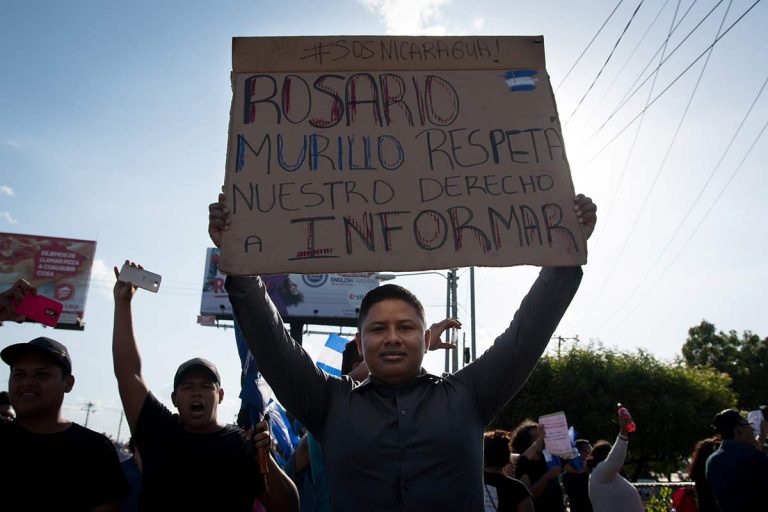29 de octubre 2020

Children of Exile: The Births “Sowing Hope” in the Camp of Nicaraguan Farmers

PUBLICIDAD 1M
PUBLICIDAD 4D
PUBLICIDAD 5D
Sandinistas argue that the law is not “to carry out a witch hunt,” but hold on to discretion in deciding which are fake news or crimes.

The 70 votes of the ruling Sandinista Front in the National Assembly approved without any opposition the Special Cybercrime Law, known as the “Gag Law.” It seeks to regulate Internet content and silence the voices of Ortega’s opponents who denounce human rights violations in Nicaragua.
You may want to read: Nicaragua: “Gag Law” Extends Censorship & Surveillance
The Law establishes penalties ranging from two to eight years in prison for the commission of different crimes. These include issuing fake news and the disclosure of confidential information of State institutions. Likewise, unauthorized access to government web pages for their modification or obtaining information.
The Law authorizes the government to request the service provider companies to “collect, extract or record data relating to a user, as well as data traffic in real time.”
Liberal deputies in the plenary reiterated the warnings of analysts and lawyers about how the law is ambiguous about the definitions of fake news or what constitutes a cybercrime. Therefore, they said it represents a danger for all citizens in the country and to media outlets.
“What must be seen in these laws is the issue of discretion to decide what is a cybercrime. Likewise, where and who will be prosecuted for these cybercrimes. This law, along with the others (Foreign Agent’s Law and Life Sentence Law), seek to promote the well-founded fear of persecution that the Nicaraguan population is facing,” said liberal deputy Azucena Castillo.
However, Ortega supporter Carlos Emilio Lopez, defended the Law, as did his colleague Walmaro Gutierrez, promoter of the Law to Regulate Foreign Agents. They claim it is not designed for persecution, but rather to modernize Nicaraguan legislation and “protect families.”
“The FSLN deputies objective when we legislate on this type of crimes is not to create an instrument to carry out a persecution or a witch hunt, as has been sought to convey here in the plenary,” Gutierrez argued.
Lopez assured that “the liars are out of business. Those who are part of the industry of lies on social networks, those who create and spread fake news, creating alarm, fear, anxiety, affecting economic stability, public order, health or autonomous security like when they said that the Army tanks were in Managua repressing and it was false. Or as when they said that a small plane flew over Managua, Masaya and Carazo spraying poison. Lie! It never happened. Or when they said that thousands and thousands of Nicaraguans were infected and thousands and thousands of deaths due to Covid. False!”
The last reference to which Lopez alludes, would also include the reports released by the independent Covid-19 Citizens Observatory. Since the pandemic began, they carry out an independent monitoring of suspected cases and deaths associated with Covid. They do so because MINSA (Ministry of Health) refuses to reveal real data on the progress of the pandemic.
The Ortega legislators also made clear that criticism and questioning on social networks will be persecuted as slander.
“We are legislating so that we are respected on social networks. Because in some networks it is common to slander, threaten,” said deputy Maritza Espinales.
The Law was “consulted” only with sectors linked to the Ortega regime. Mainly the propaganda media, that act as sounding boards for Ortega and Murillo’s messages. According to Ortega’s supporters, this Law was consulted with the magistrates Alba Luz Ramos and Marvin Aguilar, as well as Public Prosecutor Ana Julia Guido and the Attorney General, Wendy Carolina Morales.
They also claim that members of the Police, Army and the Institute for Telecommunications (TELCOR) were consulted. However, independent media were denied access to these consultations.
In the list of media outlets consulted were all those that belong to Ortega’s propaganda machine: Channel 2, 4, 6, 8, 13, “La Nueva Radio Ya,” “Radio La Primerisima,” and include a list from the “Red de Jovenes Comunicadores” (Youth Communicators Network) and the Ministry of the Interior.
They also affirm that within the new Law are included the inputs sent in written form by the Education, Culture, Sports and Social Communication Media Commission, the Infrastructure and Public Services Commission and the General Directorate of Analysis and Follow Up of the Economic Budget of the National Assembly.
During the plenary discussion, Ortega deputy Edwin Castro said they received in writing the contributions of the Nicaraguan Chamber of Internet and Telecommunications (CANITEL), although it does not appear in the Law and we do not know what those contributions were.
“And if it was not known, because it seems that my colleagues from the PLC are not here in the Assembly, the Nicaraguan Chamber of Internet and Telecommunications sent their comments to the Law in writing, which were also seen and incorporated. So, in that way there were consultations with private operators,” said Castro. He further argued against the criticism that the Law was only consulted among Sandinista sectors.
The law enters into force 60 days after it is published in the Official Gazette.
PUBLICIDAD 3M
PUBLICIDAD 3D